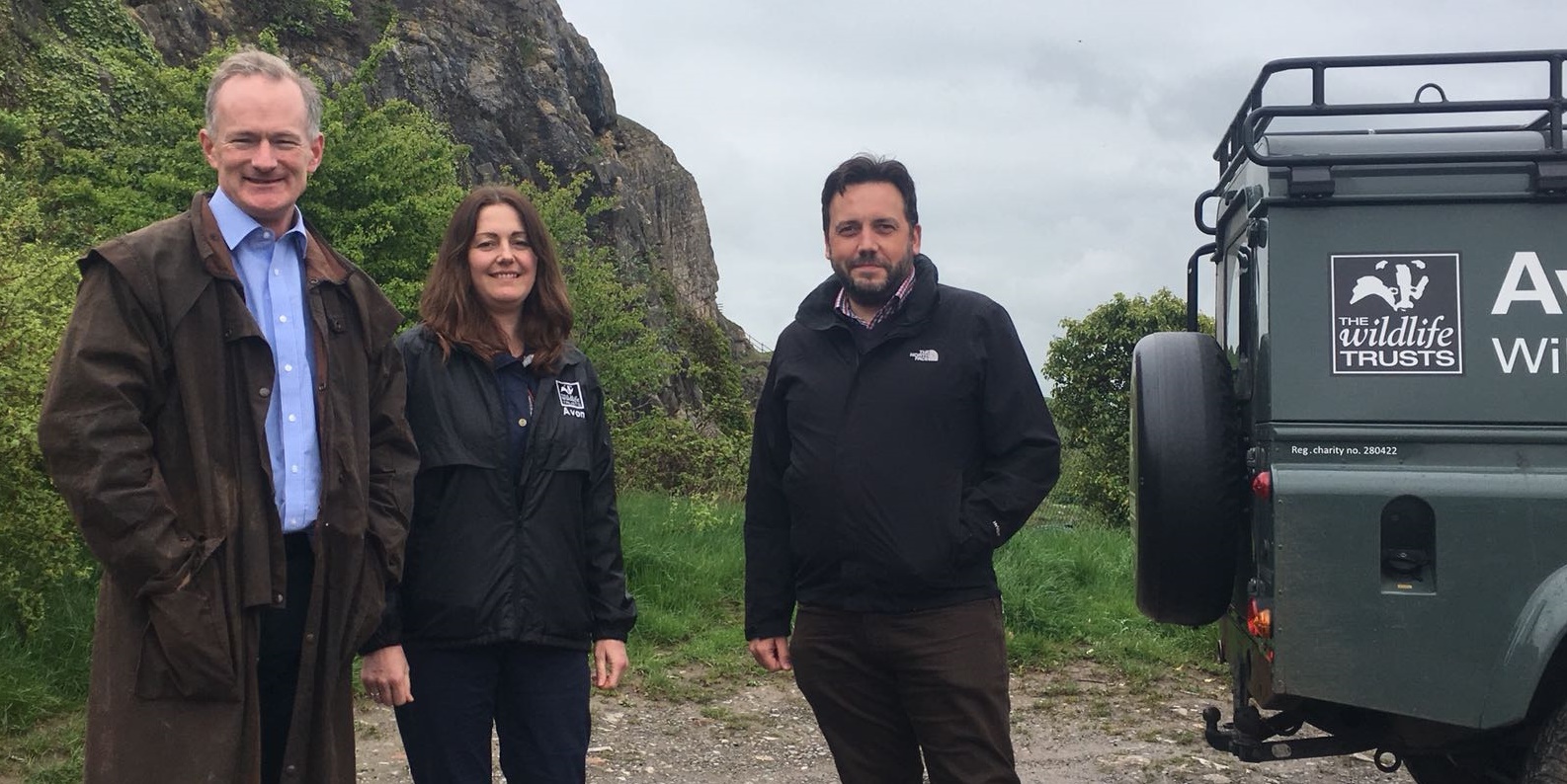Avon Wildlife Trust is urging local MPs across the region to use the unique opportunity given by two major Government consultations on farming and planning, to reverse the decline in English wildlife and influence policy on how we build new developments and farm the land in the future. AWT chief executive, Ian Barrett, met Weston-super-Mare MP, John Penrose at the Trust’s Walborough nature reserve in the Gordano Valley, and asked him to use his voice to press for stronger protections for nature and wildlife in planning and farming policy to ensure there are wild places and species within our region and across England for future generations to enjoy. In addition, AWT is encouraging everyone across Avon who wants to see nature’s fortunes improve, including local authorities, nature-friendly farmers, wildlife experts and planners, to respond to both consultations which end in early May.
The consultations present a very rare opportunity – the first in living memory – to influence the future of both national farming and planning policy and how these impact on nature in England. Precious wild places and the species that depend on them have suffered catastrophic declines over the past 70 years – intensive farming and urbanisation have been major causes.* Now the public has a chance to call for a visionary approach to the environment – one that means planning rules and farm support and regulation work together towards the recovery of our nature and wildlife.
Ian Barrett, Avon Wildlife Trust Chief Executive, says:
“This is a critical time to stand up for wildlife and make our voices heard. Decisions about housing and farming are fundamental to wildlife’s future and the right policies now will mean we can create a Nature Recovery Network and stop the continuing loss of our wildlife.
“Across North Somerset there is an enormous pressure on wildlife and habitats from proposed housing and it’s vital we balance the need for homes with protecting the valuable landscapes and rare species we have. Today was a good chance to hear John Penrose’s views on these issues and how to strike this balance.”
The West of England Joint Spatial Plan, published in January, identified locations for future development in North Somerset, including proposals to build 7,850 new houses in and around Backwell, Banwell, Nailsea and Churchill – areas Avon Wildlife Trust views as inappropriate for this scale of building. These locations include some of the few remaining wetlands in the UK and are internationally important areas for bats and other wildlife, and development risks causing significant damage to wildlife networks. AWT is calling for North Somerset Council to consider alternative locations.
John Penrose MP says:
“Building houses in the wrong places doesn’t just put roads and services under pressure; it harms our countryside and wildlife as well. That’s why we’ve got to ‘build up, not out’ to breathe fresh life into towns and cities like Weston and Bristol, and find new ways for farmers to produce great food in a wildlife-rich countryside too.”
As well as showing John Penrose what’s at stake for Avon’s landscapes in future farming, and discussing development plans across his constituency, Ian Barrett talked about the urgent need for wildlife to be taken more seriously in all planning decisions, including calling for protection for Local Wildlife Sites to be reinstated. There are hundreds of Local Wildlife Sites across Avon – areas of open space rich in wildlife. They provide the best places for wildlife in towns as well as villages and need safeguarding from any development.
The consultation on the National Planning Policy Framework is here; it closes on 10th May. The rules that guide planning for development will shape the future of housing. About 36 square miles of land are used by new developments every year and so the outcome of this consultation is hugely important for wildlife. The Wildlife Trusts want to see rules that:
• Protect wildlife and secure recognition of Local Wildlife Sites (which lose protection under the current proposals)
• Integrate wildlife habitats into new developments – for wildlife and people
• Commit to an improvement for wild species and habitats from all development (‘net biodiversity gain’)
• Require that new developments contribute to a national ‘Nature Recovery Network’ by including this in local planning strategies
The consultation on the future for food, farming and the environment is here; it closes on 8th May. It asks where public money, in the form of subsidies to farmers, should be spent in the future. It will also help to establish how the rules and standards for land management should be set and enforced. Farming practices are one of the key reasons for wildlife decline in the countryside, so if we want nature’s recovery we need a revolution in the way that farmland is managed. What works for wildlife will be good for people, too. Farmers need healthy soils and large populations of pollinators, like bees, to grow crops. We need clean, healthy water running into our rivers. We need a wildlife-rich countryside to relax in. To ensure this, The Wildlife Trusts want to see rules that:
1. Reward farmers and land managers for the benefits they provide for society, like clean water, healthy soils and a wildlife-rich countryside
2. Replace the Common Agricultural Policy with a system that supports public benefits and environmental outcomes for society
3. Changes the culture of regulation, making it easier for farmers to help nature without being weighed down by paperwork, inspections and bureaucracy
More information on The Wildlife Trusts national #ActSwiftly campaign can be found here www.wildlifetrusts.org/actswiftly. Swifts arrive back to the UK in late April and early May. The swift is a bird that needs towns and the countryside to nest and feed in; it is emblematic of the need for wildlife-rich habitats in both environments.
ENDS
Contact: Naomi Fuller, Avon Wildlife Trust Communications Manager Naomi.Fuller@avonwildlifetrust.org.uk 0117 9177270 mobile 07458 091433

